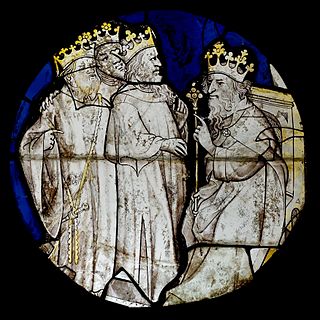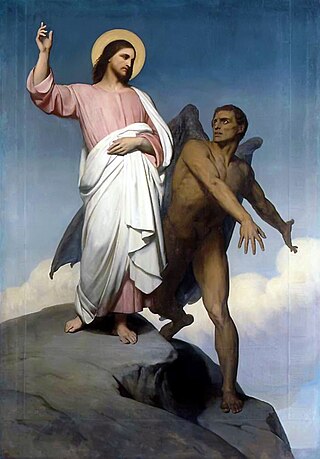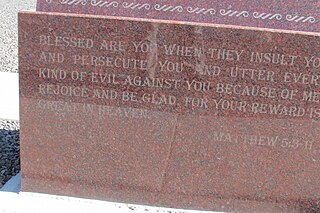
Matthew 2:2 is the second verse of the second chapter of the Gospel of Matthew in the New Testament. The magi travelling from the east have arrived at the court of King Herod in Jerusalem and in this verse inform him of their purpose.

Matthew 2:7 is the seventh verse of the second chapter of the Gospel of Matthew in the New Testament. The magi have informed King Herod that they had seen portents showing the birth of the King of the Jews. Herod has consulted with the leading Jewish religious figures who reported he was to be born in Bethlehem. In this verse Herod again questions the magi.

Matthew 2:10 is the tenth verse of the second chapter of the Gospel of Matthew in the New Testament. The magi, dispatched by King Herod, have been shown the location of the infant Jesus by the Star of Bethlehem. In this verse they react to this.

Matthew 3:2 is the second verse of the third chapter of the Gospel of Matthew in the New Testament. John the Baptist has been introduced in the first verse and this verse describes the message that he is preaching. Through John's message, Matthew introduces the "Kingdom of Heaven".

Matthew 3:7 is the seventh verse of the third chapter of the Gospel of Matthew in the New Testament. The verse occurs in the section introducing John the Baptist. In this verse John attacks the Pharisees and Sadducees.

Matthew 4:9 is the ninth verse of the fourth chapter of the Gospel of Matthew in the New Testament. It is part of the Temptation of Christ narrative. Jesus has rebuffed two earlier temptations by Satan. In this verse, Satan offers control of the world to Jesus if he agrees to worship him.

Matthew 4:17 is the seventeenth verse of the fourth chapter of the Gospel of Matthew in the New Testament of the Christian Bible. In the previous verses Jesus returned to Galilee after hearing of the arrest of John the Baptist and then left Nazareth for Capernaum. This verse reports that once in Capernaum, Jesus began to preach.

Matthew 4:18 is the eighteenth verse of the fourth chapter of the Gospel of Matthew in the New Testament. Jesus has just begun preaching in Galilee. In this verse he encounters the first of his disciples.

Matthew 4:24 is the twenty-fourth verse of the fourth chapter of the Gospel of Matthew in the New Testament. This verse is part of a brief summary of and introduction to Jesus' ministry in Galilee, which will be recounted in the next several chapters. This verse relates Jesus' fame "throughout all Syria" and summarizes his work of healing.

Matthew 5:4 is the fourth verse of the fifth chapter of the Gospel of Matthew in the New Testament. It is the second verse of the Sermon on the Mount, and the second of what are known as the Beatitudes.

Matthew 5:10 is the tenth verse of the fifth chapter of the Gospel of Matthew in the New Testament. It is the eighth verse of the Sermon on the Mount, and also eighth, and to some the last, of what are known as the Beatitudes.

Matthew 5:11 is the eleventh verse of the fifth chapter of the Gospel of Matthew in the New Testament. It is the ninth verse of the Sermon on the Mount. Some commentators consider this verse to be the beginning of the last Beatitude, but others disagree, seeing it as more of an expansion on the eighth and final Beatitude in the previous verse.

Matthew 5:19 is the nineteenth verse of the fifth chapter of the Gospel of Matthew in the New Testament and is part of the Sermon on the Mount. Jesus has reported that he came not to destroy the law, but fulfil it. In this verse he perhaps continues to reinforce this claim.

Matthew 5:20 is the twentieth verse of the fifth chapter of the Gospel of Matthew in the New Testament and is part of the Sermon on the Mount. Jesus has reported that he came not to destroy the law, but fulfill it. But in this verse, he makes clear that the common understanding of the Law is not enough.

Matthew 5:33 is the thirty-third verse of the fifth chapter of the Gospel of Matthew in the New Testament and is part of the Sermon on the Mount. This verse is the opening of the fourth antithesis, beginning the discussion of oaths.

Matthew 5:39 is the thirty-ninth verse of the fifth chapter of the Gospel of Matthew in the New Testament and is part of the Sermon on the Mount. This is the second verse of the antithesis on the command: "eye for an eye". In one of the most famous verses in the New Testament, Jesus here rejects revenge and retaliation, instead telling his followers to turn the other cheek.

Matthew 5:44, the forty-fourth verse in the fifth chapter of the Gospel of Matthew in the New Testament, also found in Luke 6:27–36, is part of the Sermon on the Mount. This is the second verse of the final antithesis, that on the commandment to "Love thy neighbour as thyself". In the chapter, Jesus refutes the teaching of some that one should "hate [one's] enemies".

Matthew 5:46 is the forty-sixth verse of the fifth chapter of the Gospel of Matthew in the New Testament and is part of the Sermon on the Mount. This is the third verse of the final antithesis, built on the commandment "Love thy neighbour as thyself". Jesus here gives another example of why one must love one's enemies.

Matthew 6:1 is the first verse of the sixth chapter of the Gospel of Matthew in the New Testament and is part of the Sermon on the Mount. This verse begins the discussion of how even good deeds can be done for the wrong reasons.

Matthew 7:11 is the eleventh verse of the seventh chapter of the Gospel of Matthew in the New Testament and is part of the Sermon on the Mount. This verse summarizes the preceding metaphors in favour of prayer.




















